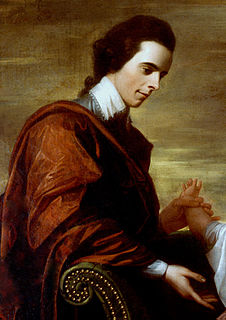A Quote by Arthur Middleton
As priests uphold their people in prayer, so their people are to uphold them with prayer and love, for he cannot work without his people.
Related Quotes
Bibles read without prayer; sermons heard without prayer; marriages contracted without prayer; journeys undertaken without prayer; residences chosen without prayer; friendships formed without prayer; the daily act of prayer itself hurried over, or gone through without heart: these are the kind of downward steps by which many a Christian descends to a condition of spiritual palsy, or reaches the point where God allows them to have a tremendous fall.
The Prophet introduced a system of prayer in that it was interwoven into man's daily work: a prayer in the morning when he arose from his bed; a prayer at lunch time, as an indication that if his body needed a diet, so did his spirit; a prayer in the afternoon when he retired from his daily work; a prayer at sunset and a prayer when going to bed.
There are some people who, in order not to pray use as an excuse the fact that life is so hectic that it prevents us from praying. This cannot be. Prayer does not demand that we interrupt our work, but that we continue working as if it were a prayer. It is not necessary to always be in meditation, nor to consciously experience the sensation that we are talking to God, no matter how nice that would be. What matters is being with Him, living in Him, in His will. To love with a pure heart, to love everybody, especially to live the poor, is a twenty-four hour prayer.
Everything starts from prayer. Without asking God for love, we cannot possess love and still less are we able to give it to others. Just as people today are speaking so much about the poor but they do not know or talk to the poor, we too cannot talk so much about prayer and yet not know how to pray.
Maybe I was praying for him then, in my own way. Does God have a set way of prayer, a way that He expects each of us to follow? I doubt it. I believe some people-- lots of people-- pray through the witness of their lives, through the work they do, the friendships they have, the love they offer people and receive from people. Since when are words the only acceptable form of prayer?
Satan cannot deny but that great wonders have been wrought by prayer. As the spirit of prayer goes up, so his kingdom goes down. Satan's strategems against prayer are three. First, if he can, he will keep thee from prayer. If that be not feasible, secondly, he will strive to interrupt thee in prayer. And, thirdly, if that plot takes not, he will labour to hinder the success of thy prayer.
If you don't pray often, you won't gain a love for praying. Prayer is work, and therefore it is not very appealing to our natural sensibilities. But the simple rule for prayer is this: Begin praying and your taste for prayer will increase. The more you pray, the more you will acquire the desire for prayer, the energy for prayer, and the sense of purpose in prayer.
The great people of the earth today are the people who pray. I do not mean those who talk about prayer, nor those who say they believe in prayer, nor yet those who can explain about prayer; but I mean these people who take time and pray. They have not time. It must be taken from something else. This something else is important, very important, and pressing, but still less important and less pressing than prayer. There are people that put prayer first, and group the other items in life's schedule around and after prayer.
It is obvious that Paul did not regard prayer as supplemental, but as fundamental-not something to be added to his work but the very matrix out of which his work was born. He was a man of action because he was a man of prayer. It was probably his prayer even more than his preaching that produced the kind of leaders we meet in his letters.
What we feel at prayer is God's business, not ours, and we must strive to be totally abandoned to the presence of 'consolation' or of boredom when we pray. A clear understanding that the value of our prayer does not depend upon how we feel is extremely important if we are to persevere in prayer. So many people feel that if their prayer is distracted it cannot be pleasing to God, and are therefore led to abandon their efforts precisely when fidelity is of the most importance.
...just as the edifice of all the virtues strives upward toward perfect prayer so will all these virtues be neither sturdy nor enduring unless they are drawn firmly together by the crown of prayer. This endless, unstirring calm of prayer... can neither be achieved nor consummated without these virtues. And likewise virtues are the prerequisite foundation of prayer and cannot be effected without it.

































